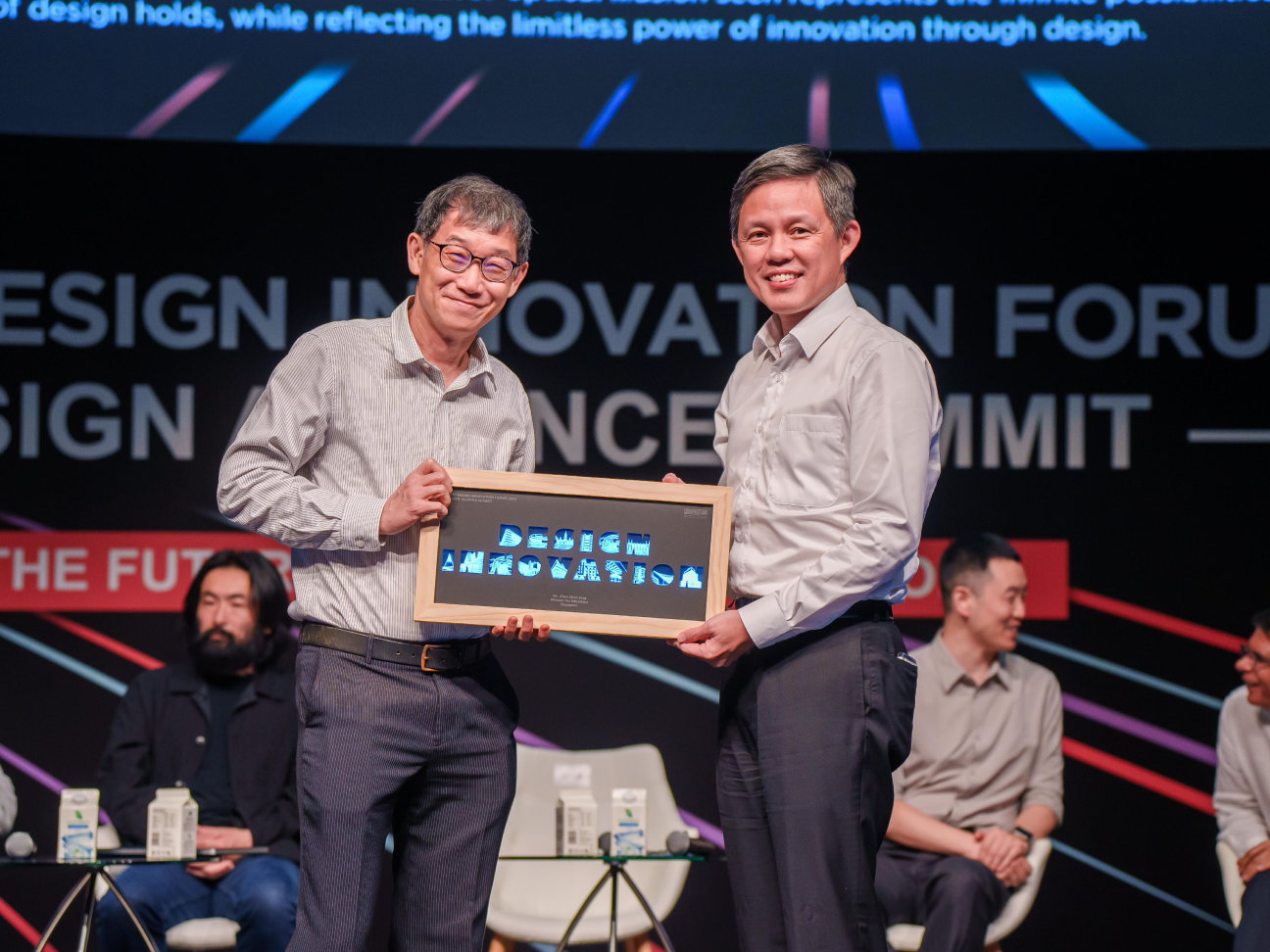Events
Filters
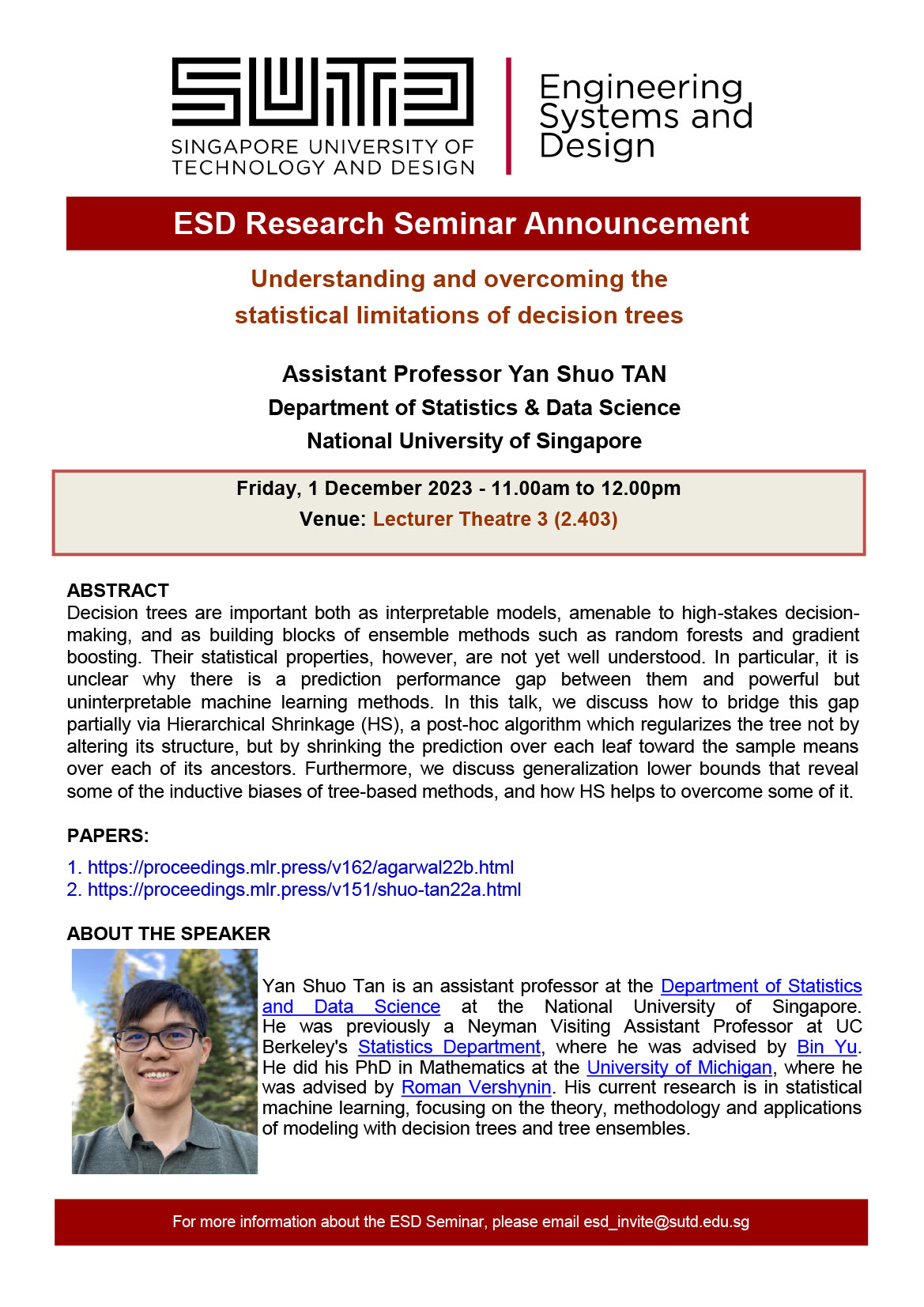
01 December 2023
Yan Shuo Tan (National University of Singapore) – Understanding and Overcoming the Statistical Limitations of Decision Trees
Decision trees are important both as interpretable models, amenable to high-stakes decision-making, and as building blocks of ensemble methods such as random forests and gradient boosting. Their statistical properties, however, are not yet well understood. In particular, it is unclear why there is a prediction performance gap between them and powerful but uninterpretable machine learning methods. In this talk, we discuss how to bridge this gap partially via Hierarchical Shrinkage (HS), a post-hoc algorithm which regularizes the tree not by altering its structure, but by shrinking the prediction over each leaf toward the sample means over each of its ancestors. Furthermore, we discuss generalization lower bounds that reveal some of the inductive biases of tree-based methods, and how HS helps to overcome some of it.

ESD
Seminar/Lecture
11.00 am – 12.00 pm
SUTD Lecture Theatre 3 (Building 2, Level 4) 8 Somapah Road
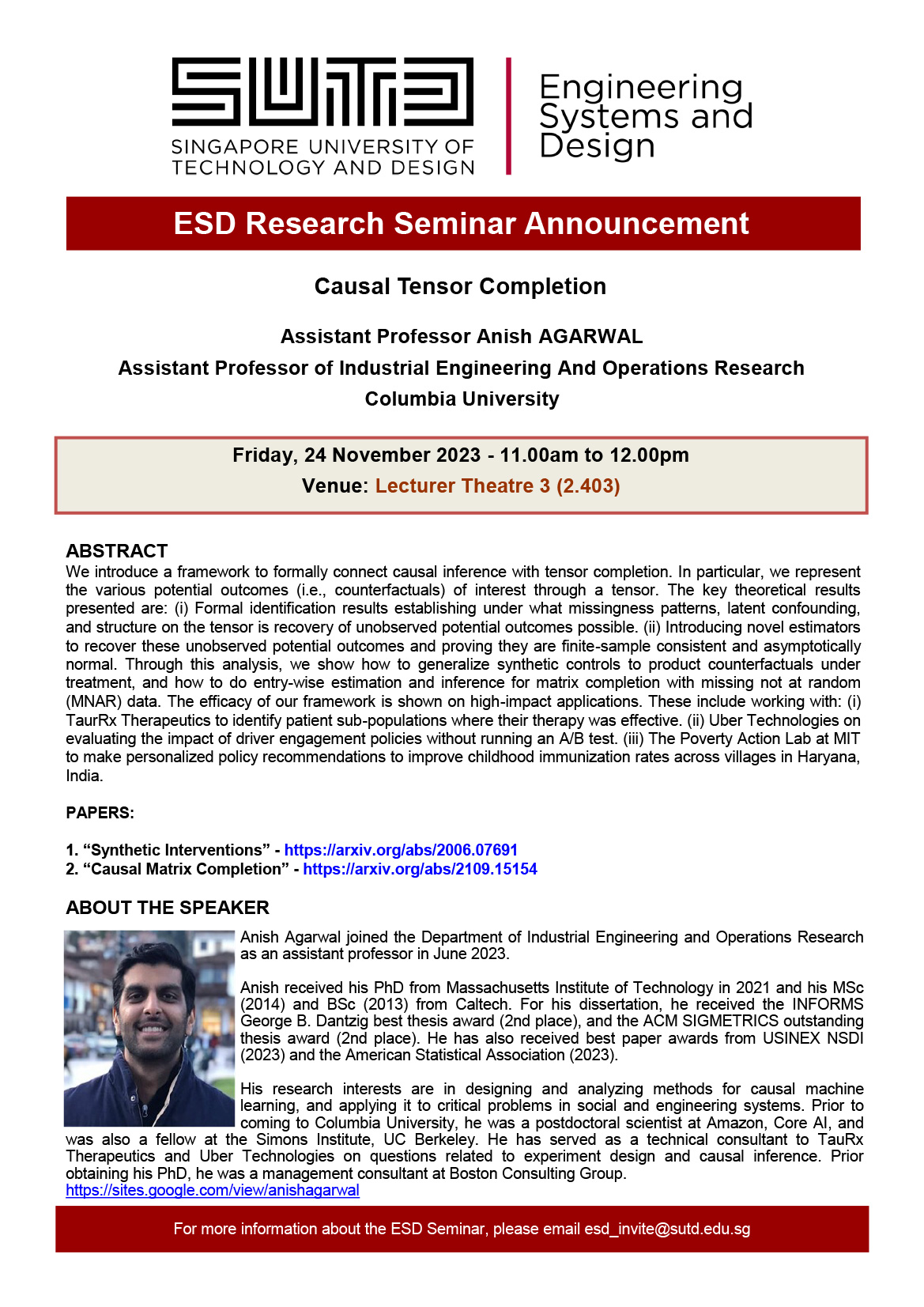
24 November 2023
Anish Agarwal (Columbia University) – Causal Tensor Completion
We introduce a framework to formally connect causal inference with tensor completion. In particular, we represent the various potential outcomes (i.e., counterfactuals) of interest through a tensor. The key theoretical results presented are: (i) Formal identification results establishing under what missingness patterns, latent confounding, and structure on the tensor is recovery of unobserved potential outcomes possible. (ii) Introducing novel estimators to recover these unobserved potential outcomes and proving they are finite-sample consistent and asymptotically normal. Through this analysis, we show how to generalize synthetic controls to product counterfactuals under treatment, and how to do entry-wise estimation and inference for matrix completion with missing not at random (MNAR) data. The efficacy of our framework is shown on high-impact applications. These include working with: (i) TaurRx Therapeutics to identify patient sub-populations where their therapy was effective. (ii) Uber Technologies on evaluating the impact of driver engagement policies without running an A/B test. (iii) The Poverty Action Lab at MIT to make personalized policy recommendations to improve childhood immunization rates across villages in Haryana, India.

ESD
Seminar/Lecture
11.00 am – 12.00 pm
SUTD Lecture Theatre 3 (Building 2, Level 4) 8 Somapah Road
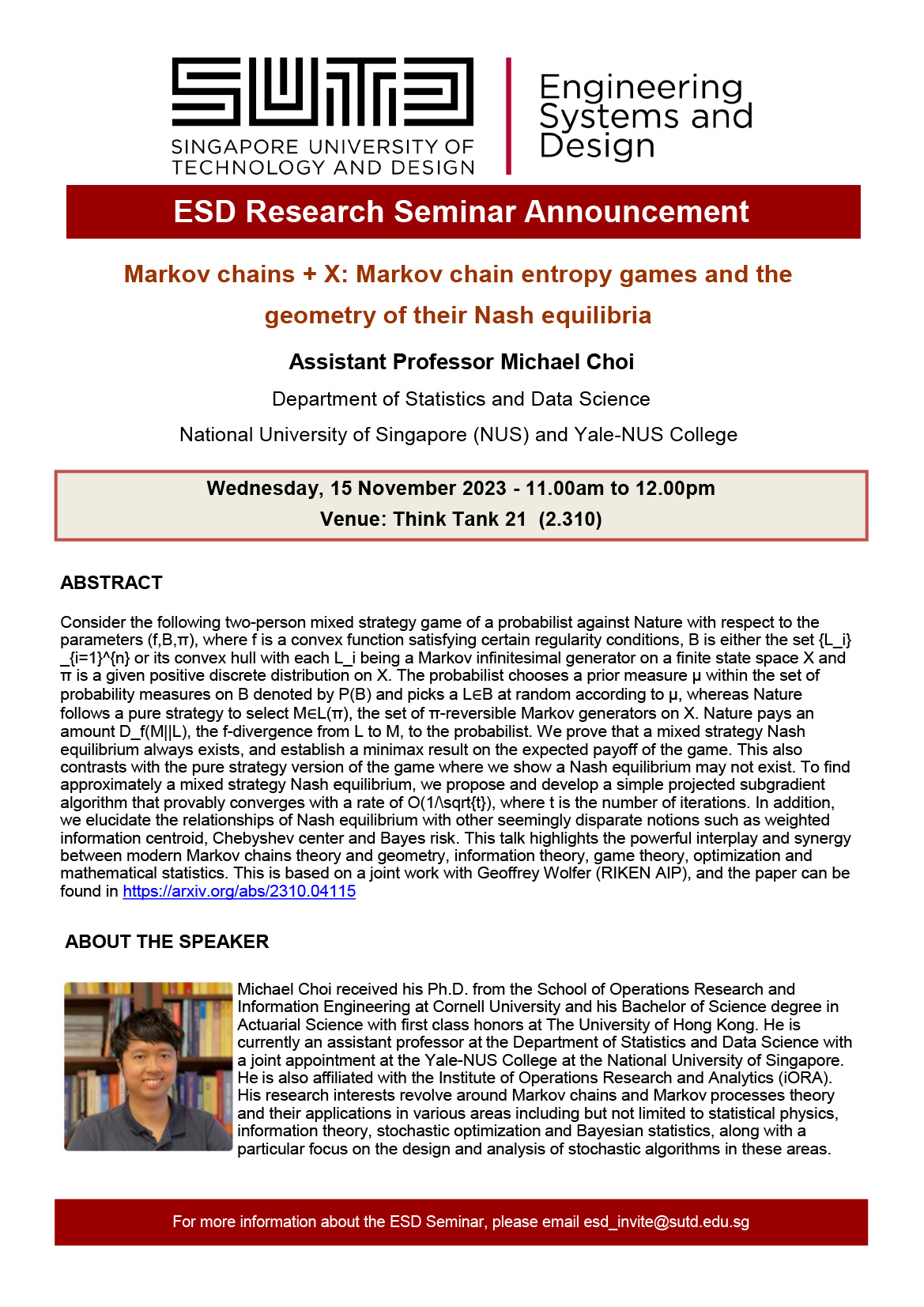
15 November 2023
Michael Choi (National University of Singapore) – Markov Chains + X: Markov Chain Entropy Games and the Geometry of their Nash Equilibria
Consider the following two-person mixed strategy game of a probabilist against Nature with respect to the parameters (f,B,π), where f is a convex function satisfying certain regularity conditions, B is either the set {L_i}_{i=1}^{n} or its convex hull with each L_i being a Markov infinitesimal generator on a finite state space X and π is a given positive discrete distribution on X. The probabilist chooses a prior measure μ within the set of probability measures on B denoted by P(B) and picks a L∈B at random according to μ, whereas Nature follows a pure strategy to select M∈L(π), the set of ππ-reversible Markov generators on X. Nature pays an amount D_f(M||L), the f-divergence from L to M, to the probabilist. We prove that a mixed strategy Nash equilibrium always exists, and establish a minimax result on the expected payoff of the game. This also contrasts with the pure strategy version of the game where we show a Nash equilibrium may not exist. To find approximately a mixed strategy Nash equilibrium, we propose and develop a simple projected subgradient algorithm that provably converges with a rate of O(1/sqrt{t}), where t is the number of iterations. In addition, we elucidate the relationships of Nash equilibrium with other seemingly disparate notions such as weighted information centroid, Chebyshev center and Bayes risk. This talk highlights the powerful interplay and synergy between modern Markov chains theory and geometry, information theory, game theory, optimization and mathematical statistics. This is based on a joint work with Geoffrey Wolfer (RIKEN AIP), and the paper can be found in https://arxiv.org/abs/2310.04115

ESD
Seminar/Lecture
11.00 am – 12.00 pm
SUTD Think Tank 21 (Building 2, Level 3) 8 Somapah Road

25 October 2023
Ariel Neufeld (Nanyang Technological University) – Markov Decision Processes under Model Uncertainty
In this talk we introduce a general framework for Markov decision problems under model uncertainty in a discrete-time infinite horizon setting. By providing a dynamic programming principle we obtain a local-to-global paradigm, namely solving a local, i.e., a one time-step robust optimization problem leads to an optimizer of the global (i.e. infinite time-steps) robust stochastic optimal control problem, as well as to a corresponding worst-case measure.

ESD
Seminar/Lecture
11.00 am – 12.00 pm
SUTD Think Tank 21 (Building 2, Level 3) 8 Somapah Road
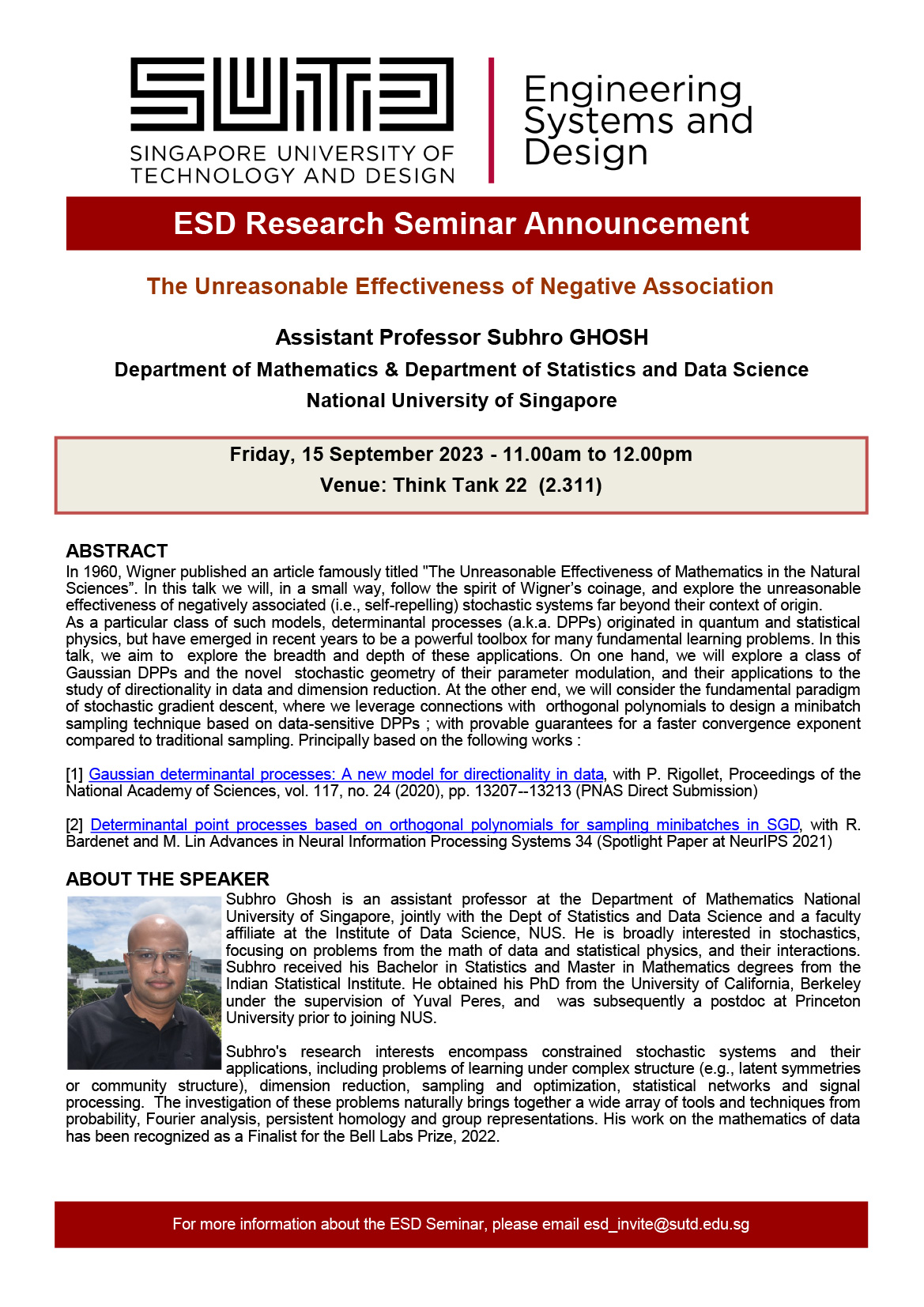
15 September 2023
Subhro Ghosh (National University of Singapore) – The Unreasonable Effectiveness of Negative Association
In 1960, Wigner published an article famously titled “The Unreasonable Effectiveness of Mathematics in the Natural Sciences”. In this talk we will, in a small way, follow the spirit of Wigner’s coinage, and explore the unreasonable effectiveness of negatively associated (i.e., self-repelling) stochastic systems far beyond their context of origin.

ESD
Seminar/Lecture
11.00 am – 12.00 pm
SUTD Think Tank 22 (Building 2, Level 3) 8 Somapah Road
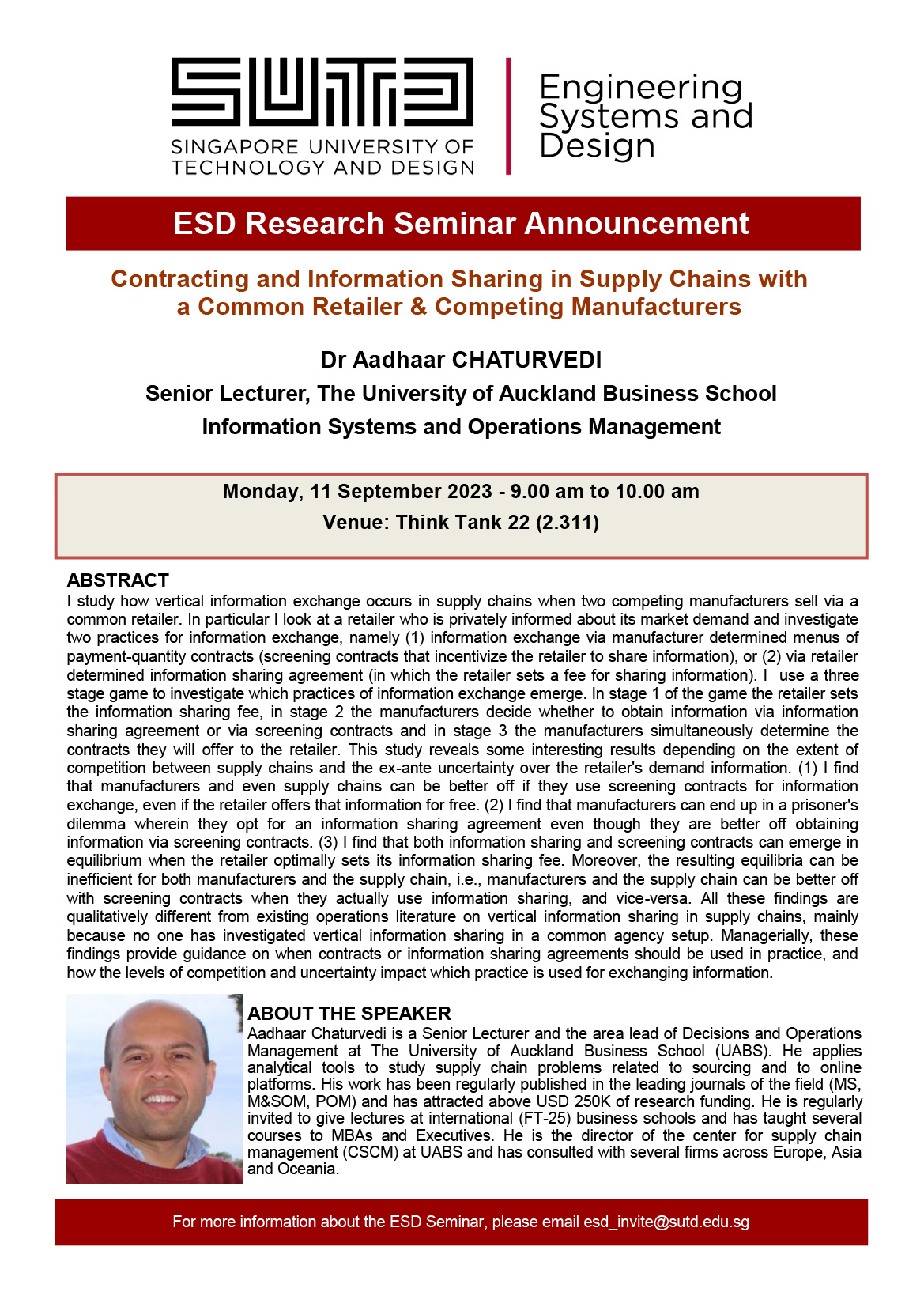
11 September 2023
Aadhaar Chaturvedi (The University of Auckland Business School) – Contracting and Information Sharing in Supply Chains with a Common Retailer & Competing Manufacturers
Aadhaar Chaturvedi (The University of Auckland Business School) – Contracting and Information Sharing in Supply Chains with a Common Retailer & Competing Manufacturers

ESD
Seminar/Lecture
9.00 am – 10.00 am
SUTD Think Tank 22 (Building 2, Level 3) 8 Somapah Road

27 August 2023
WiOpt 2023
WiOpt 2023 (https://esd.sutd.edu.sg/wiopt2023/), the 21st International Symposium on Modeling and Optimization in Mobile, Ad hoc, and Wireless Networks, will be held during 24-27 August 2023 in Singapore. WiOpt 2023 will showcase state-of-the-art research contributions from different fields in networks. It welcomes original and high-quality submissions related to modeling, performance evaluation, and optimization of networks. The focus includes but is not limited to mobile networks, edge computing, intelligent networks, content-driven networks, cognitive networks, vehicular networks, robotic systems, Internet. In addition to the three-day main conference, which features 3 keynote speeches and approximately 50 paper presentations, WiOpt 2023 will host 5 workshops comprising an additional 50 presentations on the first day. These workshops will delve into cutting-edge subjects within the realms of communications, networking, and AI. The detailed program can be found in https://esd.sutd.edu.sg/wiopt2023/program

ESD
Conference/Symposium
NTU@one-north Executive Centre 11 Slim Barracks Rise
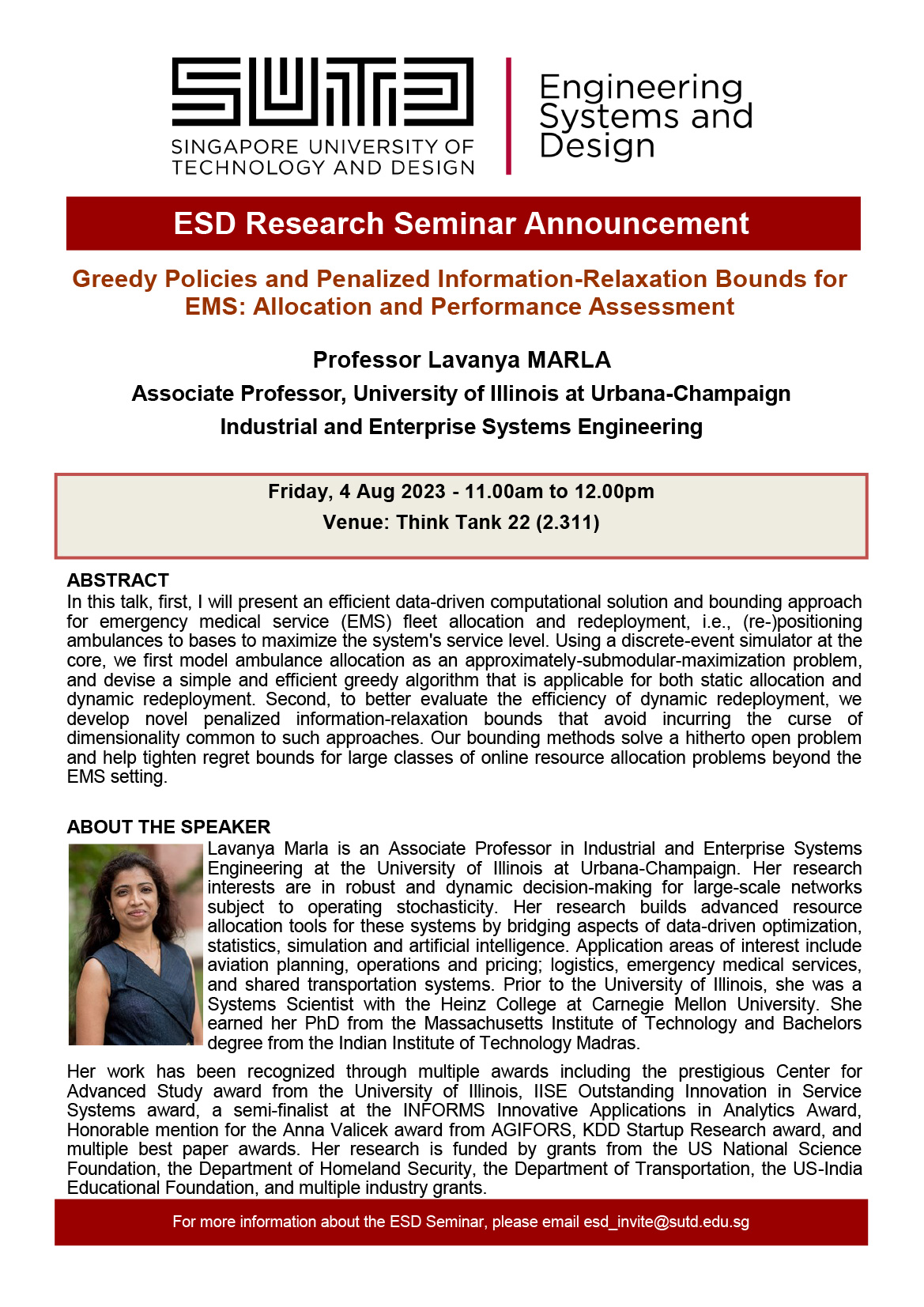
04 August 2023
Lavanya Marla (University of Illinois at Urbana-Champaign) – Greedy Policies and Penalized Information-Relaxation Bounds for EMS: Allocation and Performance Assessment
In this talk, first, I will present an efficient data-driven computational solution and bounding approach for emergency medical service (EMS) fleet allocation and redeployment, i.e., (re-)positioning ambulances to bases to maximize the system’s service level. Using a discrete-event simulator at the core, we first model ambulance allocation as an approximately-submodular-maximization problem, and devise a simple and efficient greedy algorithm that is applicable for both static allocation and dynamic redeployment. Second, to better evaluate the efficiency of dynamic redeployment, we develop novel penalized information-relaxation bounds that avoid incurring the curse of dimensionality common to such approaches. Our bounding methods solve a hitherto open problem and help tighten regret bounds for large classes of online resource allocation problems beyond the EMS setting.

ESD
Seminar/Lecture
11.00 am – 12.00 pm
SUTD Think Tank 22 (Building 2, Level 3) 8 Somapah Road

03 August 2023
Feng Li (Shandong University) – Distributed Intelligence: From An Algorithmic Perspective
Traditional AI algorithms entail resourceful and reliable computation infrastructure, whereas their efficacy cannot be ensured in many emerging distributed systems (e.g., sensor networks, vehicular networks, edge networks etc.). Deploying AI algorithms in these distributed systems entail many new concerns including fault tolerance, resource efficiency, privacy preservation etc. Furthermore, recent years have witnessed the development of AI algorithms, which provides a new way to improve the intellectuality of the distributed systems such that the efficacy of the systems can be guaranteed in application scenarios with uncertainty. In this talk, by following the above roadmap, I will highlight several research projects conducted by myself and my collaborators in the areas of distributed intelligence, mainly from an algorithmic perspective.

ESD
Seminar/Lecture
3.00 pm – 4.00 pm
SUTD Lecture Theatre 3 (Building 2, Level 4) 8 Somapah Road
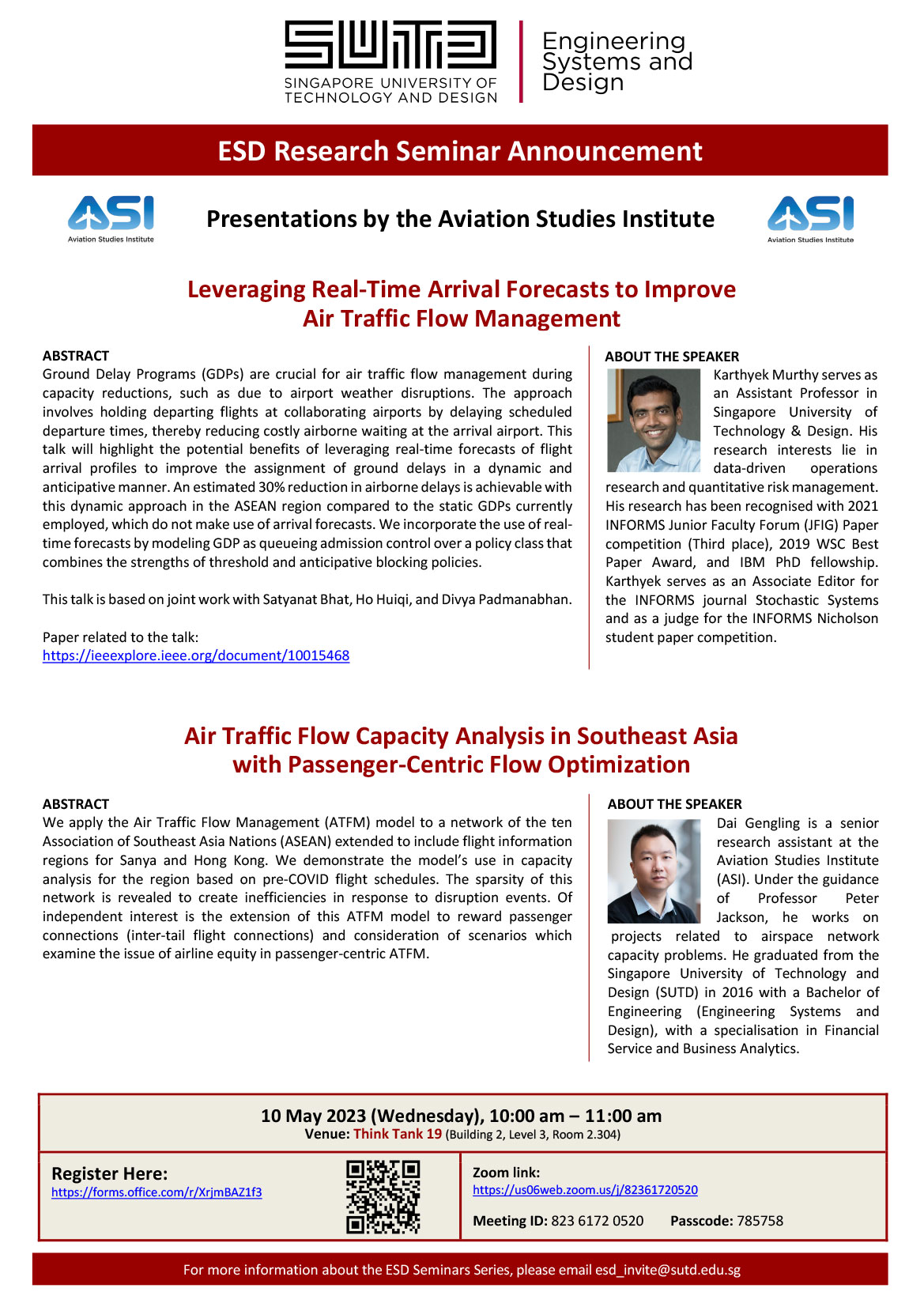
10 May 2023
Karthyek Murthy & Dai Gengling (Singapore University of Technology and Design) – Presentations by the Aviation Studies Institute
Karthyek Murthy & Dai Gengling (Singapore University of Technology and Design) – Presentations by the Aviation Studies Institute

ESD
Seminar/Lecture
10.00 am – 11.00 am
SUTD Think Tank 19 (Building 2, Level 3) 8 Somapah Road



